OP2: “Chime” by Ai Otsuka
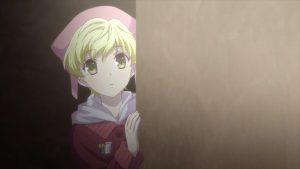 This was one of those acid test episodes for the 2019 version of Fruits Basket. In order to succeed as an adaptation (as the 2001 resoundingly did IMO, apart from stopping in the middle of the series) this was a story it absolutely had to get right. Because, quite simply, if you’re not feeling it during the events depicted here – both in the A and B-parts – Furuba is pretty much a lost cause. It might still entertain modestly on a superficial level but you wouldn’t be buying what this series is selling. And on balance, I think it passed the test with ease, continuing a strong run of episodes these last few weeks.
This was one of those acid test episodes for the 2019 version of Fruits Basket. In order to succeed as an adaptation (as the 2001 resoundingly did IMO, apart from stopping in the middle of the series) this was a story it absolutely had to get right. Because, quite simply, if you’re not feeling it during the events depicted here – both in the A and B-parts – Furuba is pretty much a lost cause. It might still entertain modestly on a superficial level but you wouldn’t be buying what this series is selling. And on balance, I think it passed the test with ease, continuing a strong run of episodes these last few weeks.
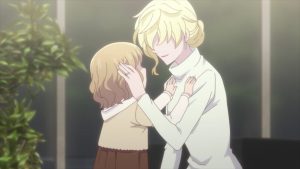 I’ve mentioned it before, but for me Momiji’s arc is the strongest of any of the cast. There were hints of why that is already, but this week’s chapter really brings it to the forefront. Fundamentally, I think Takaya is concerned with a couple of key points with this series. There’s the matter of memories, specifically painful ones. What should we remember, and what should we forget? Memory is fundamental to the Sohma family curse, on every possible level. As well, there’s the matter of “living the lie” – the face we show the world, and the one we see when we look in the mirror. When is it OK – better, even – to keep a barrier between those two sides of ourselves?
I’ve mentioned it before, but for me Momiji’s arc is the strongest of any of the cast. There were hints of why that is already, but this week’s chapter really brings it to the forefront. Fundamentally, I think Takaya is concerned with a couple of key points with this series. There’s the matter of memories, specifically painful ones. What should we remember, and what should we forget? Memory is fundamental to the Sohma family curse, on every possible level. As well, there’s the matter of “living the lie” – the face we show the world, and the one we see when we look in the mirror. When is it OK – better, even – to keep a barrier between those two sides of ourselves?
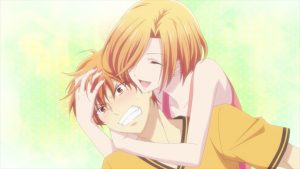 Tohru represents a fundamental conflict when it comes to the first question. The Sohmas are all about forgetting. That’s Akito’s answer to every conflict with the outside world – wipe their memories and be done with it. Tohru is all about remembering, and living with the memory. And she seems to be someone who holds nothing in reserve – she shows the world her true self at all times, for better or worse. I don’t think Takaya is taking sides here, in the sense of saying one is emphatically right and the other wrong – rather – she’s showing us both the costs and rewards of each.
Tohru represents a fundamental conflict when it comes to the first question. The Sohmas are all about forgetting. That’s Akito’s answer to every conflict with the outside world – wipe their memories and be done with it. Tohru is all about remembering, and living with the memory. And she seems to be someone who holds nothing in reserve – she shows the world her true self at all times, for better or worse. I don’t think Takaya is taking sides here, in the sense of saying one is emphatically right and the other wrong – rather – she’s showing us both the costs and rewards of each.
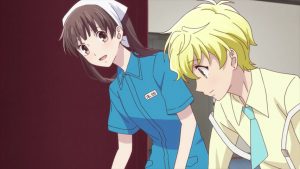 Momiji, I think, best exemplifies these core themes. He embraces his memories, even as his mother’s were wiped clean. He accepts the pain, too, but he internalizes it. Maybe the Momiji the world sees – genki, smiling, eternally playful – is his true self. But even if it is, it can also be a front at the same time. I have no doubt that Momiji’s persona is a way for him to avoid being overcome by despair at the pain he’s suffered, and still suffers. To be rejected by his mother, and at such a visceral level – how much worse could a child experience than that? Not only that, he has to live with that pain every day by seeing his mother from afar, lavishing the love he craves on his sister. But that he chooses to observe this rather than hide from it is a sign of his formidable strength – another side of himself he hides behind his childlike demeanor.
Momiji, I think, best exemplifies these core themes. He embraces his memories, even as his mother’s were wiped clean. He accepts the pain, too, but he internalizes it. Maybe the Momiji the world sees – genki, smiling, eternally playful – is his true self. But even if it is, it can also be a front at the same time. I have no doubt that Momiji’s persona is a way for him to avoid being overcome by despair at the pain he’s suffered, and still suffers. To be rejected by his mother, and at such a visceral level – how much worse could a child experience than that? Not only that, he has to live with that pain every day by seeing his mother from afar, lavishing the love he craves on his sister. But that he chooses to observe this rather than hide from it is a sign of his formidable strength – another side of himself he hides behind his childlike demeanor.
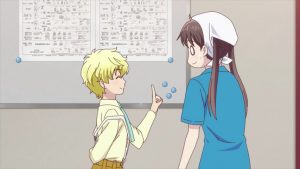 That Momiji chooses to confide all this to Tohru (though she did ask, it’s true) represents a level of trust I imagine he doesn’t extend to many people. I also think it shows that he sees in Tohru the same pain he knows in himself, and a similar courage in living with it. I was always struck by the fact that she embraced Momiji after he told her his story, despite the risks of doing so in public – she’s just not the sort of person that could hear a story like that and not do so.
That Momiji chooses to confide all this to Tohru (though she did ask, it’s true) represents a level of trust I imagine he doesn’t extend to many people. I also think it shows that he sees in Tohru the same pain he knows in himself, and a similar courage in living with it. I was always struck by the fact that she embraced Momiji after he told her his story, despite the risks of doing so in public – she’s just not the sort of person that could hear a story like that and not do so.
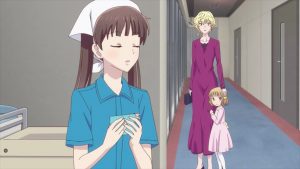 The B-part is equally important, mostly as it relates to Kyou. Of course Tohru maintains her facade even as she observes the anniversary of Kyouko’s passing, but can there be any doubt that it’s also a front to hide her sadness? The social graces that come so easily to Yuki are torture to Kyou, but of course he wants to be by her side as she visits the grave with the others. His role in the story is fairly clear – Kyou is the ultimate outsider in a family where being on the inside is everything. There’s a metaphor at play here, to be sure – Japanese society is obsessed with the concept of “inside” and “outside”. It extends right down to the language, where how you speak to someone depends on placing everyone into (or outside of) this or that circle.
The B-part is equally important, mostly as it relates to Kyou. Of course Tohru maintains her facade even as she observes the anniversary of Kyouko’s passing, but can there be any doubt that it’s also a front to hide her sadness? The social graces that come so easily to Yuki are torture to Kyou, but of course he wants to be by her side as she visits the grave with the others. His role in the story is fairly clear – Kyou is the ultimate outsider in a family where being on the inside is everything. There’s a metaphor at play here, to be sure – Japanese society is obsessed with the concept of “inside” and “outside”. It extends right down to the language, where how you speak to someone depends on placing everyone into (or outside of) this or that circle.
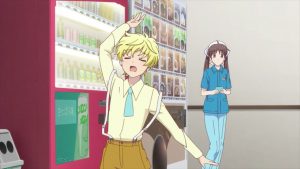 What does Kyou apologize to Tohru for (nice fake-out) at the end? Why are his waves “screaming” as he visits the cemetery with Tohru, Yuki, Saki and Arisa? Conjecture is possible, but of course the answers are still for future chapters. Nevertheless these are revealing moments for Kyou, a boy for whom the struggle of living day-to-day is always etched on his face. Artifice is another one of those things that comes naturally (too naturally) to Yuki but is agony for Kyou. This is one of those dichotomies that sits at the heart of Fruits Basket with Tohru, as ever, the hub around which it pivots.
What does Kyou apologize to Tohru for (nice fake-out) at the end? Why are his waves “screaming” as he visits the cemetery with Tohru, Yuki, Saki and Arisa? Conjecture is possible, but of course the answers are still for future chapters. Nevertheless these are revealing moments for Kyou, a boy for whom the struggle of living day-to-day is always etched on his face. Artifice is another one of those things that comes naturally (too naturally) to Yuki but is agony for Kyou. This is one of those dichotomies that sits at the heart of Fruits Basket with Tohru, as ever, the hub around which it pivots.
ED2: “One Step Closer” by INTERSECTION


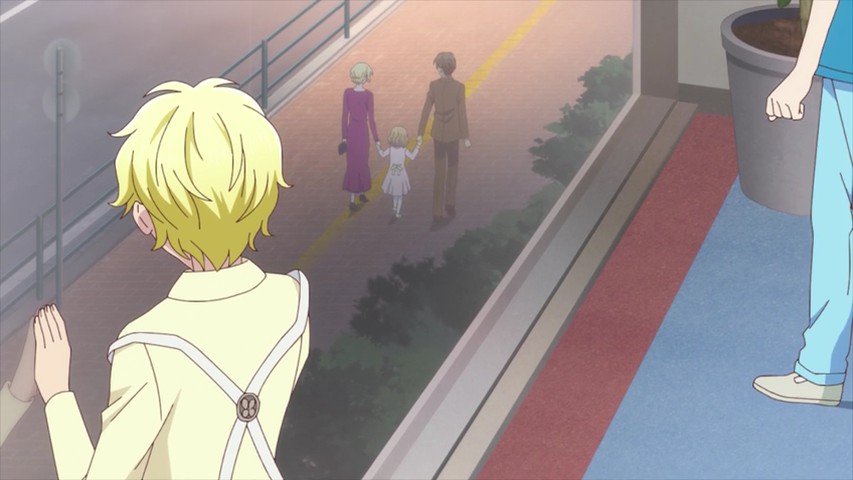
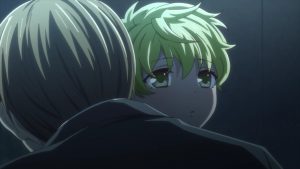
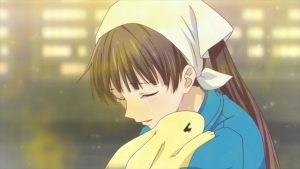
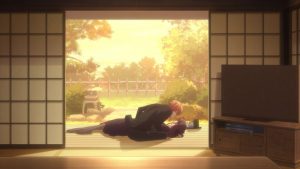
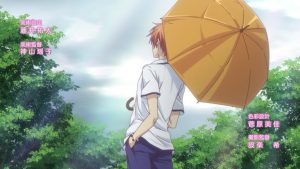
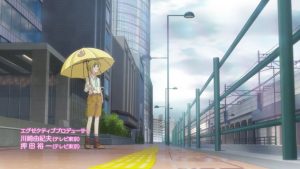
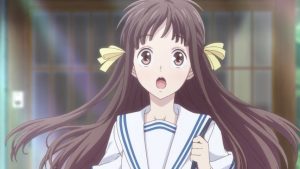
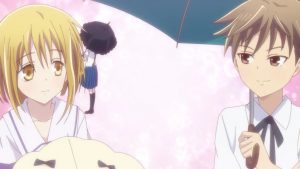
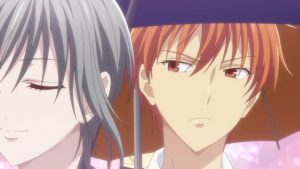
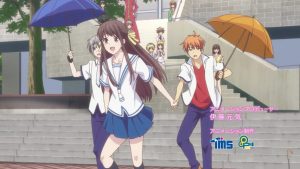
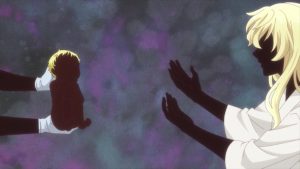
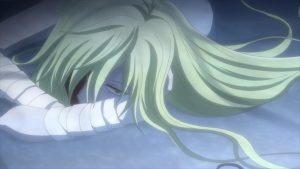
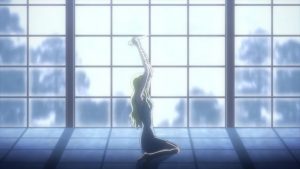
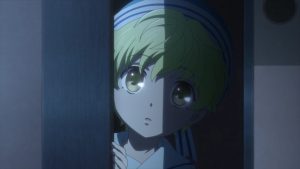
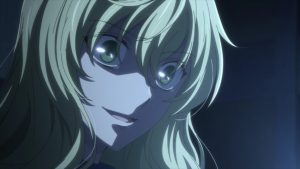
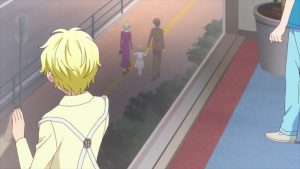
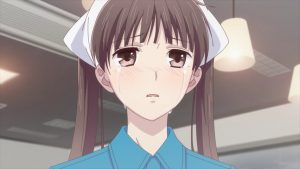
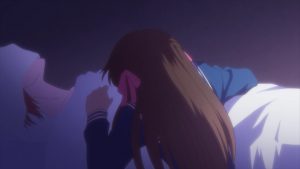
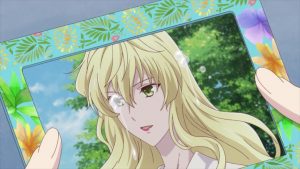
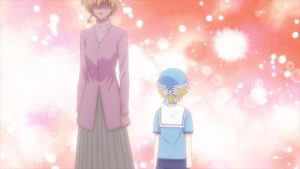
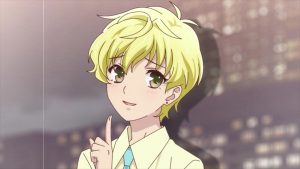
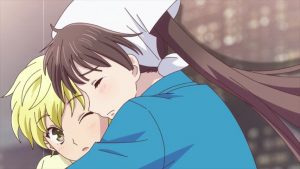
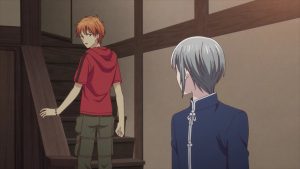
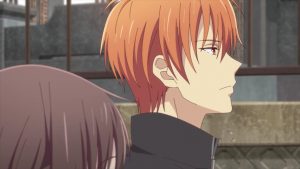
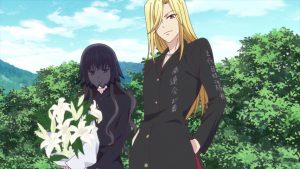
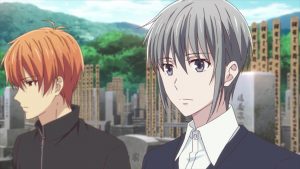
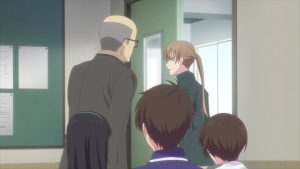
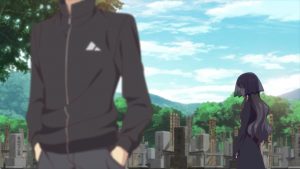
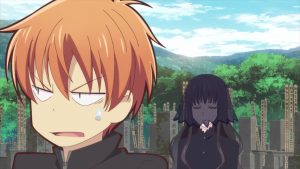
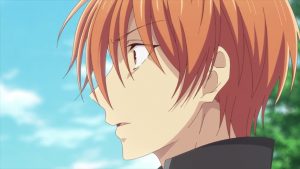
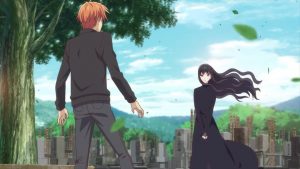
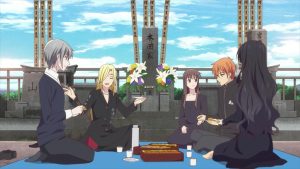
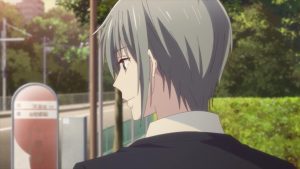
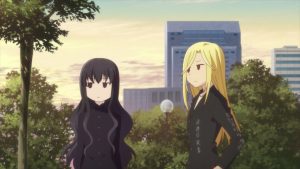
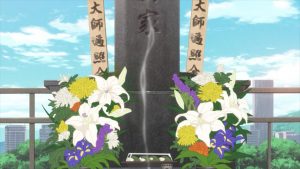
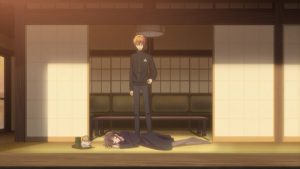
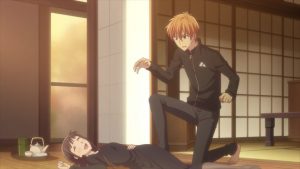
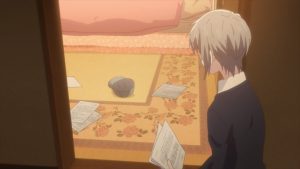
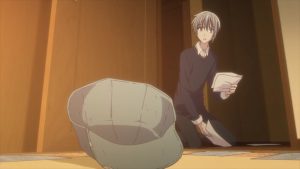
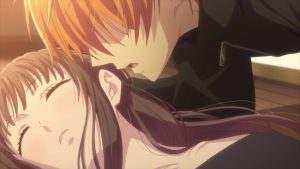
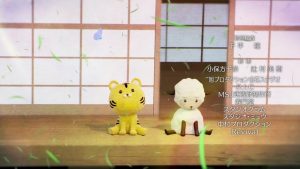
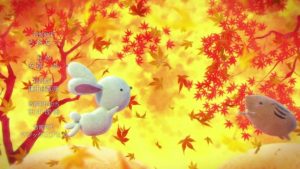
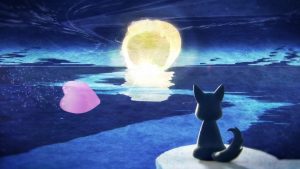
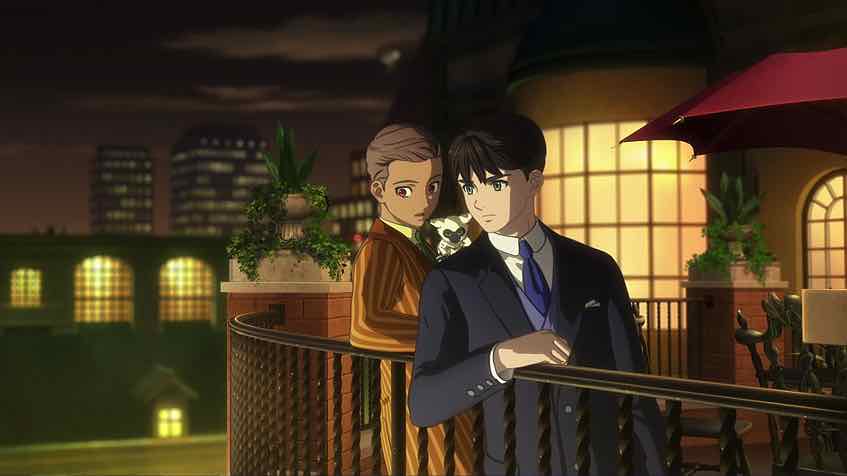
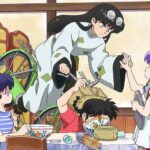
leongsh
July 6, 2019 at 7:37 pmThere’s nothing much to say about Momiji after learning about his backstory except to acknowledge that he’s the strongest character of them all in this show.
Kyon’s initial reluctance in going to the grave of Tohru’s mother and then at the grave, his turning of his face while the others said their prayers at the grave is a screaming red flag. Add to that the whispered “I’m sorry” to the ear of a sleeping Tohru marks him out as someone who definitely knew Tohru’s mother. Extrapolating that sorry could probably be that she met him that day before she died in an accident and he is now apologising for it.
sweejen
July 7, 2019 at 4:50 amI really loved the points made in this episode. Someone close to me lost a child, and the thing I have never forgotten her telling me is that she loves it when people talk about her daughter. I remembered that when Tohru and her friends were laughing over memories of her mother.
Angel
July 7, 2019 at 8:27 pmNot related but have you watched natsume book of friends movie yet?
Guardian Enzo
July 7, 2019 at 8:40 pmIt’s in the queue but it’s a matter of finding time.